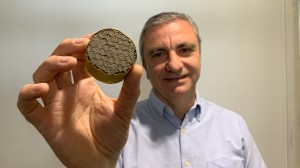A spin-out company from the University of Bath is set to develop ultralight and low-carbon next-generation materials for the aerospace and automotive industries.
Aerogel Core has been set up by engineers from the university to specialise in products containing innovative and environmentally friendly aerogels for use in soundproofing and heat shielding.

The team’s research into honeycomb-structured aerogel materials shows they can dramatically cut CO2 emissions from aircraft and other vehicles.
They could also slash aircraft noise by up to 80% – making them as quiet as a hairdryer, according to the engineers.
Crucially, they found a way of using the ‘super material’ graphene to produce aerogels that retain their shape and strength without the structure collapsing.
Now they are being funded by Innovate UK to commercialise the synthetic, porous material, which is manufactured by replacing the liquid component normally found in gels with gas.
As well as tuneable acoustic properties, ultralight aerogels have other functional properties such as thermal, fire and electromagnetic interference shielding.
Aerogel Core believes this combination of acoustic and other functional properties gives a material that could have a large impact within many industrial sectors.
In particular, the material meets the functionalities of specific engineering applications for the aerospace sector, creating the best acoustic properties for a material with incredibly low density.
Principal investigator Prof Michele Meo, pictured above, and research fellow Gian-Piero Malfense Fierro, both from the university’s Department of Mechanical Engineering, have been awarded the funding under the Innovate UK ICURe (Innovation and Commercialisation of University Research) programme.
Gian-Piero said: “Our initial calculations for a 280-aircraft fleet, like that of British Airways, would see an estimated 30-90 tonne reduction in CO2 emissions per year by using our material, due to reducing the weight of similar materials by up to 50%.
“This is ground-breaking for the aerospace industry. We look forward to commercialising the technology and proving the scalability of our manufacturing process.”
Michele added: “The funding we have received from Innovate UK proves that our research is not just theoretical or done in the lab but has real-world application and, most importantly, contributes to society.
“Having spun out we now intend to reach other markets, such as the automotive, marine, and acoustic insulation, further supporting government targets of building back greener.”
Ali Hadavizadeh, the technology transfer manager who supported the team in developing the technology from Research and Innovation Services (RIS) at the university, said the calculations for CO2 reduction to the aerospace industry went a long way in demonstrating the potential to support the government with its net zero strategy to build back greener, which aims to decarbonise all sectors of the economy by 2050.
“It also provides an excellent example for our university strategy in supporting our research priority of sustainability and core value of adopting best environmental practice,” he said.
The team will now focus on proving the scalability of the technology through automation of the manufacturing process and further material development.
The Innovate UK grant will provide the first steps towards commercial exploitation and expanding the business case for other markets.




















